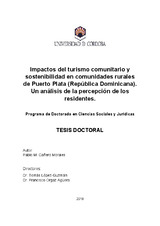Impactos del turismo comunitario y sostenibilidad en comunidades rurales de Puerto Plata (República Dominicana). Un análisis de la percepción de los residentes
Autor
Cañero Morales, Pablo M.
Director/es
López-Guzmán, TomásOrgaz Agüera, Francisco
Editor
Universidad de Córdoba, UCOPressFecha
2018Materia
Turismo comunitarioSostenibilidad
Comunidad rural
Impactos
República Dominicana
Oferta
Turismo
Desarrollo sostenible
Community-based tourism
Sustainability
Rural community
Impacts
Dominican Republic
Offer
Tourism
Sustainable development
METS:
Mostrar el registro METSPREMIS:
Mostrar el registro PREMISMetadatos
Mostrar el registro completo del ítemResumen
El turismo es, sin duda uno, de los motores económicos a nivel mundial y así lo
corroboran los datos oficiales de la Organización Mundial del Turismo (OMT). La llegada
de turistas internacionales en los diferentes destinos mundiales ha evolucionado, por
consiguiente, también han aumentado los ingresos por turismo internacional y esto
provoca que el turismo sea la tercera industria que más ingresos genera y supone
alrededor del 10% del Producto Interior Bruto (PIB) mundial. Pero la industria no se ha
mantenido estática durante este proceso de cambio. Tanto la oferta como la demanda
han sido cada vez más exigentes y esto ha resultado en importantes cambios y
adaptaciones a las necesidades del mercado.
En los últimos años han aparecido nuevas formas de turismo más sostenibles, donde
existen elementos relacionados con el descanso, el disfrute y la protección del medio
ambiente o el conocimiento de la cultura local, a través de políticas que favorecen la
sostenibilidad del destino. En este sentido, el turismo comunitario se configura como
una tipología turística que se desarrolla en contacto con las comunidades locales. Este
turismo ayuda a mejorar el desarrollo socioeconómico de las comunidades locales, a la
vez, que fomenta la conservación de sus tradiciones, formas de vida y costumbres.
Aunque, esta tipología de turismo también genera importantes impactos negativos. El
objetivo principal de esta investigación es analizar la percepción de las comunidades
rurales de Puerto Plata (República Dominicana) hacia el turismo comunitario.
Para poder realizar el análisis propuesto, se ha usado el cuestionario como técnica de
recolección de datos. Las comunidades rurales de la provincia de Puerto Plata fueron
las elegidas para recoger la muestra. Los datos se analizaron previamente en SPSS y
SmartPLS para la realización del contraste de hipótesis mediante el sistema de
ecuaciones estructurales. Entre las principales conclusiones, cabe destacar que el
turismo genera importantes beneficios en los lugares donde se desarrolla. Si bien, hay
que tener muy en cuenta los negativos para poder desarrollar la actividad de manera
sostenible. El apego de la comunidad por parte de los residentes se asocia
positivamente con los impactos ambientales percibidos, así como con los culturales y
sociales. Además, el turismo comunitario influye positivamente en el desarrollo del
turismo sostenible. Tourism is undoubtedly one of the economic engines worldwide and this is corroborated
by the official data of the World Tourism Organization (UNWTO). The arrival of
international tourists in different world destinations has evolved, therefore, the income
from international tourism has also increased and this causes that tourism is the third
industry that generates more income and represents around 10% of the World’s Gross
Domestic Product (GDP). But the industry has not remained static during this process of
change. Both offer and demand have been increasingly demanding and this has resulted
in important changes and adaptations to the needs of the market.
In recent years new forms of more sustainable tourism have appeared, where there are
elements related to rest, enjoyment and protection of the environment or knowledge of
local culture, through policies that favor the sustainability of the destination. In this sense,
community-based tourism is configured as a tourist typology that is developed in contact
with local communities. This tourism helps to improve the socioeconomic development
of local communities, at the same time, which encourages the conservation of their
traditions, ways of life and customs. Although, this type of tourism also generates
significant negative impacts. The main objective of this research is to analyze the
perception of rural communities in Puerto Plata (Dominican Republic) towards
community-based tourism.
In order to carry out the proposed analysis, the questionnaire has been used as a data
collection technique. The rural communities of the province of Puerto Plata were chosen
to collect the sample. The data was previously analyzed in SPSS and SmartPLS for the
realization of the hypothesis contrast by the system of structural equations. Among the
main conclusions, it should be noted that tourism generates significant benefits in the
places where it is developed. However, we must take into account the negatives in order
to develop the activity in a sustainable manner. Community attachment by residents is
positively associated with perceived environmental impacts, as well as cultural and social
impacts. In addition, community tourism has a positive influence on the development of
sustainable tourism.

